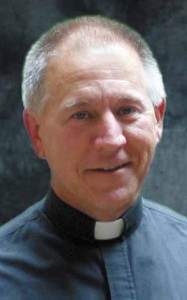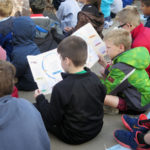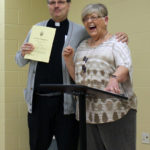By Fr. Bud Grant
A few weeks ago in Dubuque I asked Archbishop Michael Jackels to help me answer a question I’d just gotten about Laudato Si: “How can we help our pastors bring the pope’s teaching to the parish?” He rose slowly from his seat, paused, and said: “Start by reading it.”

With that in mind, I’d like to propose how to read this perhaps intimidating document.
Step one: Notice the logical order of the table of contents. Chapter 1 discusses environmental crises and the social crises that result. The point? The two are related. Chapter 2 examines theology, the sciences, the humanities and tradition for a better understanding of our relationship to God’s creation. The point? We need diverse perspectives.
Chapter 3 focuses on the causes, the principle one of which is over-consumption. This means that all other crises — including climate change — are triggered by our consumption. Pope Francis also talks a lot about the promises and perils of technology. Chapter 4 turns to the theme of what Cardinal Joseph Bernardin called the “seamless garment” of Catholic social teachings, which is to say that ecological, social, economic, political, cultural and spiritual crises are all interwoven: to tug at one thread is to tear at the whole fabric of our relationships.
Chapter 5 proposes that solutions to these inter-woven crises must be found at all levels of society, from the local community to international cooperation. He makes clear that this is a global issue and that it will take great cooperation among nations and great courage by national leaders to make significant change. Chapter 6 is, well, it is my favorite chapter. Here he dwells on theological and spiritual ideas that span the spectrum from the very Catholic to the universal. Each member of the Trinity, to cite one exquisite theme, offers something unique to Creation. Christ is incarnated “terra” (I love the Italian: earth, soil, land…); the Eucharist is the union of spirit and matter; Mary is the Queen of Creation.
Step two: look at the footnotes. He cites St. John Paul II and Pope Benedict 23 times each, 17 different bishops’ conferences (nine from the developing world), the catechism, non-Catholic and even non-Christian sources and…very few theologians. The take-away? He is not talking “top down” but demonstrating that he is the spokesperson for the community and — get this — he is creating his own theology even as he applies it to the environment, a theology of “right relationship.”
Step three: watch out for key terms (and terms he doesn’t use). For example, overconsumption is mentioned 30 times, climate change 12. He prefers the term “creation” (248 times) to “nature” (114 times). “Democrat” and “Republican” are each used zero times. The term “political” (52 times) really means “government,” lacking the polemical and polarizing connotation. Cognates of “relationship” pop up 254 times, making it the single-most important concept of the encyclical. This summer I asked one of my closest friends, an ecologist, what he was trying to restore. His answer was startlingly like that of Francis: “I’m not trying to restore any ecosystem,” he said, “I’m trying to restore a relationship with creation.” (I must say, I am blessed with the very best of best friends).
Step four: look for how Pope Francis locates his text in the context of our tradition. He explicitly mentions Rerum Novarum (1891) which is the first of the great social encyclicals, along with Pacem in Terris, Octogesimus Adveniens, Centesimus Annus and several others. Point? He is not really saying anything all that new: environmental theology is an obvious extension of our traditional concern for the common good.
Step five: notice who else he cites: scientists, philosophers, civic groups, the Orthodox patriarch, Dante and a ninth-century Sufi mystic. Point? He is reaching out to “every person on this planet” (3).
Now, I think, it may be easier to follow Archbishop Jackels’ advice to read the encyclical.
(Father Bud Grant is a professor of theology at St. Ambrose University in Davenport.)











